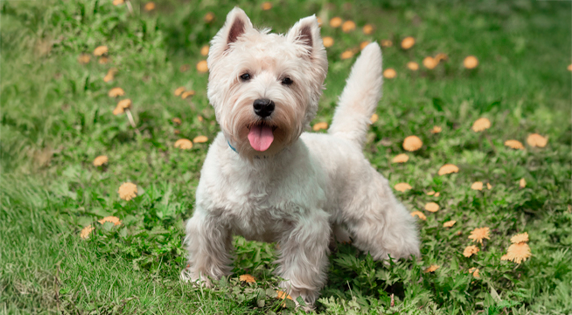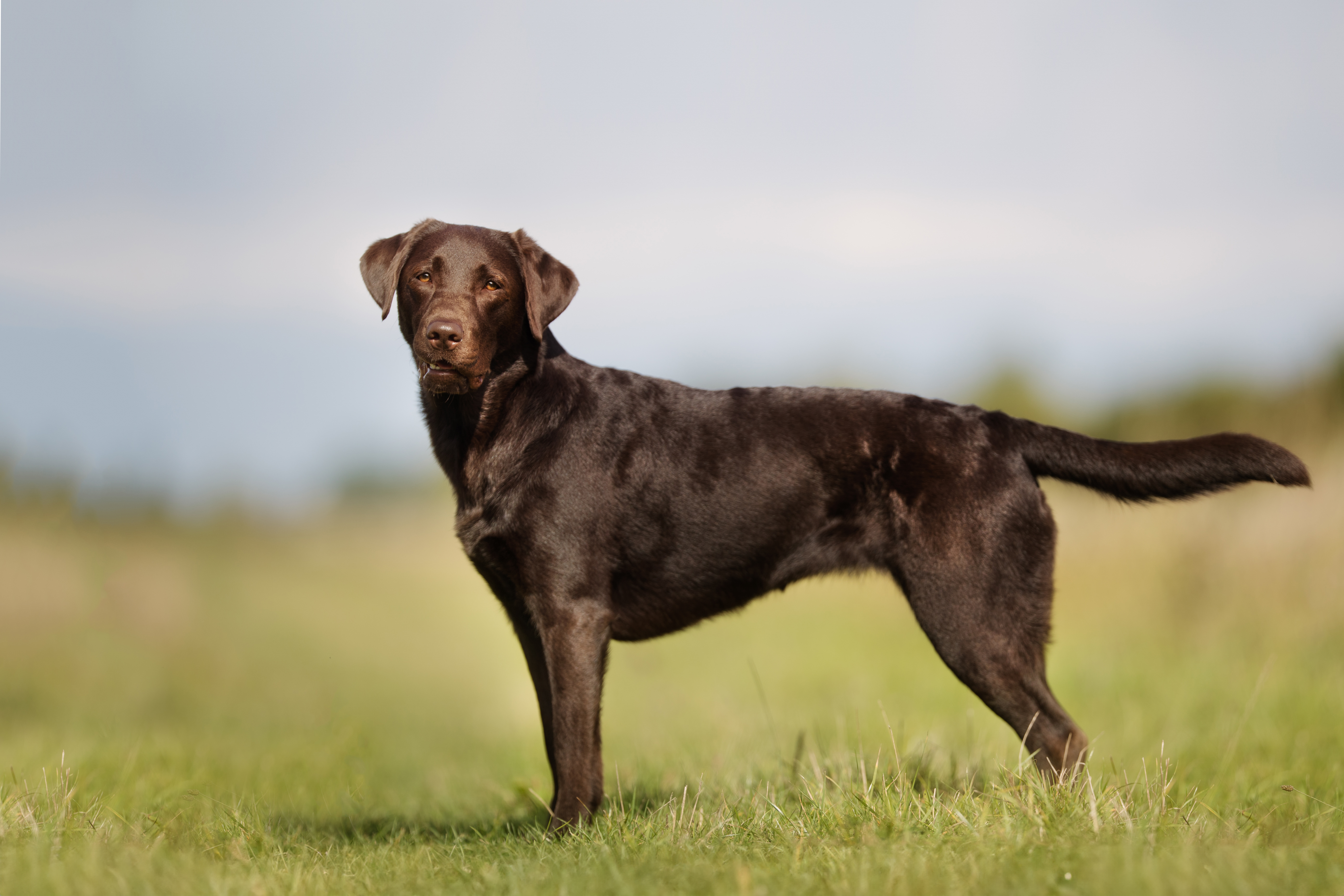
What is the best dog food?
The answer to the above question is subjective and depends on your own preference and that of your dog. We’ve made an overview of the most popular diets in every category, using our extensive range of dog foods.
The West Highland White Terrier is a small, sturdy terrier with a coarse, bright white coat and a lively, piercing expression. Originally from Scotland, this breed was developed for hunting small game and is known for its courage, cheerful appearance, and strong personality. The Westie is intelligent, energetic, and loves exercise, play, and attention. He is fond of people but retains a strong sense of independence, which makes a consistent and gentle training approach essential. Thanks to his alertness and curious nature, he is always aware of what’s happening around him. The West Highland White Terrier is an excellent companion for those seeking an active, confident dog who enjoys being part of family life and is always up for an adventure.

The West Highland White Terrier originated in the Scottish Highlands, where it was developed in the 19th century from various terrier breeds, including the Cairn Terrier and the Scottish Terrier. It was originally bred for hunting small game such as foxes, badgers, and otters. The breed’s striking white coat served a practical purpose it allowed hunters to distinguish their dogs more easily from prey during the hunt.
The Westie is strongly associated with the Malcolm family of Poltalloch, who intentionally selected white dogs for breeding. The breed was especially valued for its courage, independence, and strong work ethic. While originally a true working dog, its charming character and distinctive appearance soon made it popular as a companion dog as well. Today, the West Highland White Terrier is one of the most recognized terrier breeds worldwide.
The West Highland White Terrier is a cheerful, self-assured dog with a bold personality. He is affectionate and forms a close bond with his family, while still maintaining a good dose of independence. This little terrier is intelligent and eager to learn, which makes him highly trainable although his stubborn streak can be challenging for inexperienced owners. The Westie is energetic and playful but often behaves calmly indoors as long as he gets enough physical activity and mental stimulation. He is naturally alert and won’t hesitate to raise the alarm if something unusual happens. His curious and observant nature makes him a vigilant yet friendly household companion who thrives in a loving, active environment where he receives plenty of attention, play, and structure.
The West Highland White Terrier is a small, compact dog with a sturdy and well-balanced build. He appears robust and confident, with a square silhouette and a straight back. His bright white coat, combined with his dark eyes and black nose, gives him a striking and expressive appearance. His head is proportionally large with a pronounced stop and a short, powerful muzzle. His eyes are almond-shaped, dark and lively, giving him an alert and intelligent expression. The ears are small, triangular, and stand erect, enhancing his typical terrier look. He has a broad, deep chest and well-muscled fore- and hindquarters without appearing coarse. His coat consists of a rough, harsh outer layer and a soft undercoat that protects him from cold and dirt. The coat stands slightly away from the body and requires regular grooming to prevent matting and maintain its texture. To preserve the coat’s structure, it must be hand-stripped regularly.
The West Highland White Terrier is an active and curious dog who needs sufficient daily exercise to stay balanced. Despite his small size, he has a surprising amount of energy and a lively temperament. A mix of several short walks, playtime, and mental stimulation for at least 60 to 90 minutes per day is ideal. Originally bred as a working dog with a hunting instinct, the Westie enjoys activities that engage his nose, such as scent games, detection, or tracking tasks. He also enjoys retrieving or performing simple obedience exercises. If he doesn’t get enough physical or mental activity, he can become bored, which may lead to excessive barking, digging, or chasing small animals. A Westie thrives best with an owner who actively involves him in daily life and helps channel his energy in a positive way.
His unique coat structure requires regular grooming to prevent matting and skin issues. Weekly brushing is essential, and approximately every three to four months the coat should be hand-stripped to remove dead hairs and maintain texture. Clipping is discouraged, as it can damage the quality of the coat. Although the white coat is striking, it repels dirt relatively well. However, he can still get quite dirty after playing outside or digging. When necessary, he can be bathed using a mild dog shampoo that doesn’t dry out the skin. It’s also important to consistently care for the ears, eyes, teeth, and nails. The Westie’s ears can be sensitive, so regular checks and cleaning if needed can help prevent problems. Brushing the teeth or providing dental care snacks also supports good oral health. Despite his small size, the Westie requires a dedicated grooming routine to keep his coat and overall health in top condition.
The West Highland White Terrier is generally a healthy breed but does have some hereditary conditions. Atopic dermatitis is common and causes itching, redness, and skin infections due to allergies. The Westie is also prone to keratoconjunctivitis sicca (KCS), or dry eye, which can lead to irritation and corneal issues. Additionally, copper accumulation in the liver and liver shunts may occur two separate conditions that can severely affect liver function and metabolism. Hip dysplasia and Legg-Calvé-Perthes disease are also seen in the breed, both of which can cause joint issues and lameness.
A responsible breeding choice, regular veterinary checkups, and early detection of symptoms all contribute to maintaining a Westie’s optimal health.
Are you charmed by the West Highland White Terrier but also curious about other dogs with a similar size, character, or appearance? While the Westie is a unique breed, there are several other dogs with comparable temperament, energy level, or grooming needs:
All these breeds share the Westie’s origins as small hunting dogs, their confident demeanor, and their need for stimulation and companionship.
If you’re considering getting a West Highland White Terrier, it’s important to thoroughly research the breed and choose a reputable breeder. The Westie is an affectionate and cheerful dog, but also one with a strong character and specific grooming needs.
A good breeder is crucial for a healthy and well-socialised puppy. Ideally, choose a breeder affiliated with a breed club and who conducts health testing on the parent dogs. Hereditary conditions are not uncommon in Westies, so medical screening is vital. Puppies should also be raised in a home environment with plenty of stimuli, promoting socialisation and helping them become accustomed to daily sounds, people, and other animals. A responsible breeder will also ask about your home situation, dog experience, and expectations to assess whether the breed is a good fit for you.
The price of a Westie varies depending on factors such as breeding care, socialisation, health tests, and pedigree. A noticeably low price may indicate corners have been cut on these important aspects.
By doing your research in advance and choosing a breeder who prioritises health and welfare, you increase your chances of welcoming a happy, healthy, and well-adjusted Westie into your life for many years to come.
The West Highland White Terrier is a feisty, intelligent, and affectionate dog with a strong personality. Although small in size, he requires an owner who understands his character and is actively involved in his training and daily activities. Below are a few points to help determine whether this breed is a good match for you:
The Westie is a great fit for someone who is:
The West Highland White Terrier is ideal for someone who appreciates a cheerful, independent dog with personality. He’s well suited to both individuals and families, provided there’s enough attention given to exercise, training, and companionship.
The Westie is relatively easy to guide, but his stubborn streak and energetic nature can present a challenge for inexperienced dog owners. However, for beginners who are patient, willing to learn, and have enough time, he can be a fantastic first dog. If you already have experience with dogs, you’ll likely enjoy the intelligence and playfulness this breed has to offer.
The West Highland White Terrier is best suited to owners with some experience, or to motivated beginners who are prepared to invest in his training, energy needs, and grooming.

The answer to the above question is subjective and depends on your own preference and that of your dog. We’ve made an overview of the most popular diets in every category, using our extensive range of dog foods.

This blog article discusses 10 commonly kept medium-sized dog breeds with the most important characteristics associated with these breeds. Dogs in this category have an adult weight between 10-25 kg. This is our top 10 medium dog breeds. Looking for a different breed? Check out our dog breeds page.

If you've ever owned a dog, you'll know that every dog is unique. Dogs can have breed-specific characteristics, though, like joint or coat issues. To support these specific characteristics, Royal Canin has created special nutrition that meets the needs of individual dog breeds. Read all about breed-specific dog food in this article!

Add products to view your basket
We use cookies to help us serve you better and more personally. Functional cookies ensure that the website works properly and have an analytical function. We also use technology to track your behaviour anonymously, both inside and outside our website. Personal data and cookies may be used for personalisation or advertising. Want to know more? Read our privacy policy and cookie statement here. If you choose to reject, we will only place functional and analytical cookies.
